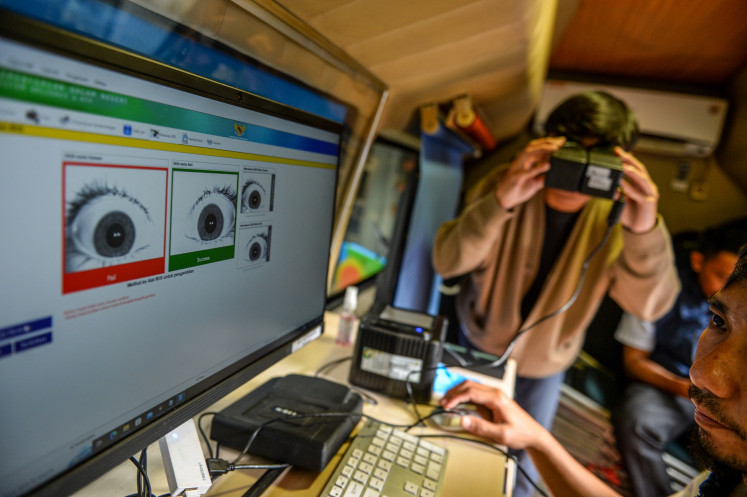Popular Reads
Top Results
Can't find what you're looking for?
View all search resultsPopular Reads
Top Results
Can't find what you're looking for?
View all search resultsDisruptors, disrupted: Have Indonesian start-ups lost their way?
Some start-ups involved in the Preemployment Card program have ironically gone against their defining principle of disruption to instead embody the age-old proverb, "If you can't beat them, join them."
Change text size
Gift Premium Articles
to Anyone
O
ne of the founding tenets of start-up companies the world over is that they disrupt the established order. The raison d'être among Silicon Valley start-ups is to develop simple and affordable innovation for a new audience, and ultimately displace the incumbents.
No other tech leader channels this spirit better than Facebook founder Mark Zuckerberg with his now infamous motto, "Move fast and break things." And none draws the ire of Silicon Valley start-ups than the middleman.
Some of the biggest tech companies today began as start-ups that aimed to disrupt the traditional way companies delivered their goods.
E-commerce giant Amazon founded its business on the premise of displacing brick-and-mortar stores by taking its orders directly from customers and shipping its goods directly from its hundreds of "fulfillment centers" that operate at a breakneck speed.
Travel booking platforms like Expedia and Trivago sought to take over the role of travel agents and allow holidaymakers to book flights and hotels from the millions in their listings. Start-ups like Airbnb went even further with their incarnation to disrupt the hotel industry by allowing people to rent out their properties to travelers. If Airbnb has its way, we might soon see hotels populated only by those rich enough to splurge.
Ride-hailing companies like Uber and Lyft also operate with the same modus operandi, disrupting the transportation industry by allowing passengers to book rides anytime and anywhere at a fraction of regular taxi fares. By offering people a more convenient and affordable transportation option, these transportation start-ups have also dealt a heavy blow to taxi companies.
Read also: Jokowi must give underprivileged millennials more attention. They deserve it
The same goes for streaming services like Netflix and Spotify, which have effectively rendered traditional broadcasters obsolete by delivering movies and drama series or podcasts and music directly to any internet-connected device. In the case of Spotify, not only has it killed off record stores, it has also made record labels irrelevant, as artists can sell their music directly through the platform.
Some of Silicon Valley's ideas and innovations have also landed on our shores in the past decade, and we have seen an explosion of start-up companies hell-bent on disrupting how things are done in Indonesia. These start-ups are operating across a variety of sectors from e-commerce to on-demand transportation services and to e-learning, and have transformed lives, created new jobs and contributed significantly to economic growth.
These local start-ups have also made waves in the political domain. Until a few years ago, Jakartans could rely on smart city app Qlue to file complaints with the city administration on the quality of public service, an innovation that certainly fit the libertarian, "break things" spirit of Silicon Valley innovators. And the appointment of a key figure from the start-up world as education minister could be an indication of the sector's growing clout.
But at the end of the day, there are only so many things that start-ups can disrupt. While they find the most efficient way to deliver groceries to your door and match lenders with borrowers, they remain open to the temptation to partake of the good old rent-seeking enterprise of getting government contracts by offering subpar services for maximum payback.
The drama involving a few tech start-ups in President Joko Widodo's flagship Preemployment Card skills training program is a deplorable episode in Indonesia's start-up narrative. For example, one start-up raked in billions from video tutorials that users must download as a precondition for government funding.
Read also: Preemployment card draws criticism as workers ‘need cash aid’
This is certainly not the kind of disruption that Zuckerberg and other tech pioneers envisioned in Silicon Valley.
And if we trust the critics who said that these video tutorials were similar to those available for free on the internet, we should certainly question the merits of shelling out Rp 5.6 trillion in taxpayers' money for such products – especially when money is in short supply during the COVID-19 pandemic.
No less outrageous is the type of skills training that some e-commerce platforms offer in exchange for the government's Preemployment Card fund. While most workers who have lost their jobs due to the COVID-19 fallout come from the informal sector, some tutorials offer skill sets that are a world away. Some of these tutorials are "Tips on Designing Facebook Ads", "Digital Marketing in Action" and "Marketing Strategy to Win the Hearts of Millenials and Gen Z" – all available for under Rp 1 million.
From the look of these tutorials, we can see that they were cobbled together for release when the government launched the program.
The tragicomedy of the Preemployment Card program is that the each tech start-up that is participating has turned into the very entity that they aimed to displace: the intermediary, the go-between, the middleman who gets the government contract to distribute the stimulus funds by throwing in a token e-learning tutorial or two.
In a long fall from grace, the disruptors have become the disrupted.










